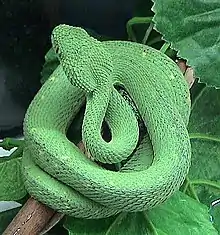| Atheris chlorechis | |
|---|---|
 | |
| Scientific classification | |
| Domain: | Eukaryota |
| Kingdom: | Animalia |
| Phylum: | Chordata |
| Class: | Reptilia |
| Order: | Squamata |
| Suborder: | Serpentes |
| Family: | Viperidae |
| Genus: | Atheris |
| Species: | A. chlorechis |
| Binomial name | |
| Atheris chlorechis (Pel, 1851) | |
| Synonyms | |
| |
Atheris chlorechis is a viper species found only in the forests of West Africa.[1][3][5] No subspecies are currently recognized. It is the type species of its genus.[5][6] It is venomous.[5]
Description
Adults average 50 cm (20 inches) in total length (body + tail), with a maximum total length of 70 cm (28 in). The tail is relatively long. The body is relatively slender, with 25–36 midbody rows of dorsal scales. These are heavily keeled, with the keels ending in a swelling at the end of each scale.[3]
Adults have a uniform light green ground color, overlaid with a series of faint yellow, roughly paired spots running dorsally along the length of the body and about 2.5 cm (about 1 in) apart. The belly is pale green in color.[3] Newborns are tan-brown in color, but this changes to a yellow-green hue with irregular dark spots within 24 hours.[7] This second color phase has been described as the reverse of that of the adults and is only seen in individuals less than 25 cm (9.8 in) in total length.[3][7]
Common names
Western bush viper,[3] West African leaf viper,[4] West African tree viper.[8]
Geographic range
Atheris chlorechis is found in West Africa from Sierra Leone through Guinea, Liberia, Ivory Coast, and Ghana to southern Togo. Records from Nigeria, Cameroon, and Gabon are considered erroneous.[1]
The type locality is listed as "Boutre, Ghana".[2][5]
Habitat
Found in forests, in dense foliage about 1–2 m (about 3–6 ft) above the ground.[3]
Feeding
Said to feed on rodents, lizards and tree frogs.[3]
Reproduction
Gives birth to 6–9 young in March to April. Newborns are 131–151 mm (about 5–6 inches) in total length.[7]
References
- 1 2 3 Penner, J.; Luiselli, L.; Rödel, M.-O.; Segniagbeto, G.; Joger, U.; LeBreton, M.; Chippaux, J.-P.; Chirio, L. (2021). "Atheris chlorechis". IUCN Red List of Threatened Species. 2021: e.T178495A126509345. doi:10.2305/IUCN.UK.2021-3.RLTS.T178495A126509345.en. Retrieved 23 November 2022.
- 1 2 McDiarmid RW, Campbell JA, Touré T. 1999. Snake Species of the World: A Taxonomic and Geographic Reference, Volume 1. Washington, District of Columbia: Herpetologists' League. 511 pp. ISBN 1-893777-00-6 (series). ISBN 1-893777-01-4 (volume).
- 1 2 3 4 5 6 7 8 Mallow D, Ludwig D, Nilson G. 2003. True Vipers: Natural History and Toxinology of Old World Vipers. Malabar, Florida: Krieger Publishing Company. 359 pp. ISBN 0-89464-877-2.
- 1 2 Mehrtens JM. 1987. Living Snakes of the World in Color. New York: Sterling Publishers. 480 pp. ISBN 0-8069-6460-X.
- 1 2 3 4 Atheris chlorechis at the Reptarium.cz Reptile Database. Accessed 23 November 2022.
- ↑ "Atheris chlorechis". Integrated Taxonomic Information System. Retrieved 23 November 2022.
- 1 2 3 Spawls S, Branch B. 1995. The Dangerous Snakes of Africa. Ralph Curtis Books. Dubai: Oriental Press. 192 pp. ISBN 0-88359-029-8.
- ↑ Brown JH. 1973. Toxicology and Pharmacology of Venoms from Poisonous Snakes. Springfield, Illinois: Charles C. Thomas. 184 pp. LCCCN 73-229. ISBN 0-398-02808-7.
Further reading
- Boulenger GA. 1896. Catalogue of the Snakes in the British Museum (Natural History). Volume III., Containing the...Viperidæ. London: Trustees of the British Museum (Natural History). (Taylor and Francis, printers.) xiv + 727 pp. + Plates I.- XXV. (Atheris chlorechis, pp. 508–509.)
- Cansdale GS. 1961. West African Snakes. London: Longman's. 96 pp. ISBN 058260849X.
- Pel, H.S. (1851). "Over de jagt aan de Goudkust, volgens eene tienjarige eigene ondervinding". Nederlands Tijdschrift Jagtkunde. 1: 149–173. (Vipera chlorechis)
External links
- Atheris chlorechis at The World Of Atheris. Accessed 8 September 2007.
